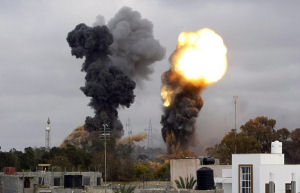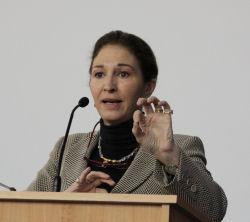The elephant in the tent: social and political justice, Tel Aviv, August 2011: a response to Or Rosenboim
Tel Aviv has known many hot summers in its history. But 2011 will probably be remembered as an exceptionally burning summer, one in which the city was flooded by tents occupied by young middle class residents, protesting against the rise in the cost of living. As Or Rosenboim argues, these protests were characterised by the claim to “go beyond the political”, to ask for social justice, referring to the colloquial distinction between issues relating to security and defence, and particularly, the Israeli-Palestinian conflict, regarded as “the political”, and “the social”. I wish to argue that these protests are closely interlinked to questions of foreign policy even though they put in much time and effort to avoid them. In a video …

Which Entity is the Government of Libya and Why does it Matter?
In the past couple of days, Germany and Canada have joined the group of countries that have declared that they consider the National Transitional Council (NTC) in to be the “legitimate representative” of the Libyan people. But what exactly does this mean? According to the BBC, the group of countries extending this recognition includes France, the UK, Italy, Spain, Germany, the UAE, Qatar, Jordan, Gambia, Senegal and Australia. Russia and the United States have had meetings with the NTC and have also made similar declarations about the illegitimacy of the Gaddafi regime and about the legitimacy of the NTC (see previous post by Stefan Talmon on the US position in March). What are the legal implications, if any, of these …

Dr Marwa Daoudy Discusses the Syrian Uprising
On May 31 2011 Dr Daoudy shared her thoughts about the events in Syria with St. Antony’s students and faculty over a lunch seminar organised by Warden MacMillan. Ever since it started at the end of January, the Syrian uprising has been continuously in the news. Dr Daoudy discussed the opposition, the army, and the potential future scenarios for Syria. The opposition, it shares some characteristics with that of Egypt and Tunisia. It’s led by youth with no overriding ideology or religious affiliation. Dr Daoudy points out that the advantage of this type of opposition is that it can be labeled as anything, but the disadvantage is the lack of leadership and the inherent divisions within the opposition movement. The …

Professor Anne-Marie Slaughter Discusses New Shifts in US Diplomacy
Professor Anne-Marie Slaughter Discusses New Shifts in US Diplomacy
Play Episode
Pause Episode
Mute/Unmute Episode
Rewind 10 Seconds
1x
Fast Forward 30 seconds
00:00
/
Subscribe
Share
RSS Feed
Share
Link
Embed
Download file | Play in new windowOn May 18, 2011 Professor Anne-Marie Slaughter delivered the inaugural Distinguished Fulbright Lecture in Oxford. The topic: The Turn: US Foreign Policy from 2009 to 2011. The key message I took away from the lecture was that during the Obama Presidency, US diplomatic missions have shifted their focus more towards societal actors. The nature of US diplomacy has expanded from acting almost exclusively on a government to government basis, to interacting with societal actors or even acting as a facilitator between societal actors in different countries. This change in diplomacy is part of the emergence of a new paradigm driving the US Foreign Policy post “9/11”. In this paradigm, separation gives way to interconnectedness, conflict to collaboration; and the sole …
Is Operation Odyssey Dawn a ‘Just’ Intervention? Assessing the Relationship Between Cause and Conduct
As Operation Odyssey Dawn gets underway, political leaders within the coalition continue to articulate their reasons for resorting to force. In so doing, each has invariably invoked the language of the just war tradition. On the eve of military action, President Obama proclaimed, ‘Our goal is focused, our cause is just, and our coalition is strong. ’ Similarly, in his remarks to the Commons on 20 March 2011, Prime Minister David Cameron argued that coalition forces had a ‘just cause’ to use force. When it comes to assessing prospective causes for resorting to arms, few could be more compelling than the protection of populations under threat of mass slaughter. It was on the basis of this pressing need to protect that …
History Repeating? Cairo 2011 and the lessons from Tehran 1978
While again hundred thousands of Egyptians show their defiance of the old regime at Cairo’s Tahrir Square and worker protests have broken out in several Egyptian cities, Washington and London still follow a pipe dream of a gradual transition from Hosni Mubarak to a more or less democratic, yet by all means secular new government. However, the web of Western diplomatic moves might turn into a Gordian knot as Egypt 2011 shows analogies to Tehran in 1978. Nations resemble Tolstoy’s families: every one is unhappy in its own way. And yet, when people’s harm escalates and they take matters in their own hands, the differences fade and clear patterns emerge. One such pattern stipulates that revolutions are rarely isolated instances …
The Delegate and the Trustee
Tony Blair A Journey: My Political Life Knopf, 2010 720 Pages £35.00 ISBN 978-0307269836 “This shows what it’s like being Prime Minister. That’s exactly what the readers want to know. How does it feel to run a country? How does it feel to be so cut off? How does it feel to be so hated?” – ”The Ghost” This is the obvious checklist for a political memoir, a genre which still manages to be notoriously boring. Tony Blair’s A Journey, though, purposefully evokes a sense of unceasing contingency about the life of the 51st British prime minister. His thematically organized memoir is a folksy, well-paced, and at times cinematic rendering of a decade in office begun in exhilaration and finished …









